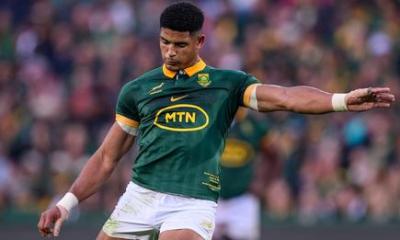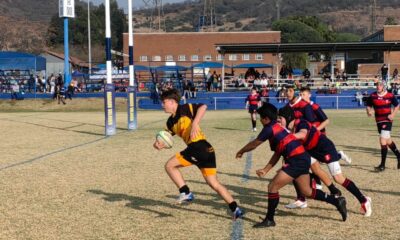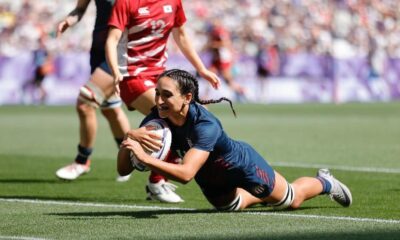
Sport

Ackerman touched by World Cup rugby
The recently concluded 2024 Touch Rugby World Cup in Nottingham, England, was certainly touched by the presence of Daniel Ackerman, who played for the South Africa men’s 30s team and had coaching roles with two other teams.
Besides helping the men’s 30s team place seventh overall out of 19 countries, this 35-year-old director of sports at Johannesburg-based Dainfern College also served as the assistant coach for the South African mixed open side and as coaching consultant for the ladies 27 team.
The latter team claimed the bronze medal, while the mixed open side, which had men and women take to the field, would have made the round of 16 if it had won one more game during the seven-day tournament between 14 and 21 July.
Ackerman’s most memorable moment from the World Cup was scoring a try in a televised quarter final match against Australia. Although the men’s 30s side ended up losing against the eventual champions, Ackerman was touched by the world champions saying that his side was the toughest opposition they faced at the World Cup so far.
Australia won 12 of a possible 13 gold medals across all teams. “It’s the strongest country in the touch world,” Ackerman says, “so to get it in the quarter final was just bad luck.”
The match gave Ackerman a bittersweet feeling. “Going up against Australia, you know you’re going to lose given how strong it is. It’s Australia’s most popular social sport. It has numbers and support that we simply don’t have, but we played our best game against it.”
Ackerman has been involved with the national touch rugby team for about eight years. He was very disappointed to miss out on playing in the 2019 World Cup after getting injured in the final warmup game. He has coached in two World Cups: 2018 and 2023.
Leading up to this year’s World Cup, he trained two or three times a day, getting up early to be at the gym at 04:00. He also spent time studying the game from a technical analysis viewpoint. “I mean, I wasn’t going out with my friends on weekends. The past few months revolved around the World Cup. Touch rugby is a massive part of my life. I play four times a week on a social level. It really is all-encompassing in my world.”
Ackerman says he could write a book about why he’s so passionate about touch rugby. He has been involved in the sport for nearly 20 years, and Gauteng provincial touch rugby since 2006, now serving as the association’s chairperson.
“It’s incredible in its accessibility,” he says. “No matter who they are, what they look like, how fast, how slow, how good, how bad – it just provides an opportunity for everyone. It has given me a family away from my immediate family. The majority of my friends play the sport.
“Touch rugby has taught me life values. It’s an honesty-based sport. If I make minimal contact, even with one finger, it still counts, so it teaches you to be honest. It has changed my life.
“When I was in high school at Crawford College International in Sandton, I played tennis, cricket, soccer, and contact rugby. One day, we had a touch rugby coach [Thabo Motsumi] come during an activation drill, and within the first practice, I was hooked. He later became one of the mentors in my life.”
Ackerman would love touch rugby to be included in the Maccabi Games. After all, he knows of four or five Jewish players who represented South Africa at this year’s World Cup. One of them, Capetonian Hayley Landau, played for the over-35 women’s team that attained the bronze medal.
Ackerman says touch rugby was growing exponentially in Johannesburg until the start of the COVID-19 pandemic. “It has taken quite a knock with the arrival of other sports like padel and five-a-side soccer. Without funding or government support, it relies on individuals to fund and grow the sport.”
Ackerman self-funded his World Cup trip. “Each player had to pay about R60 000 to try to get to the World Cup. We lost a few of our strong players who have come from underprivileged communities. They couldn’t afford it. Being a pay-to-play sport, we lose out on so much talent.”
Ackerman says a country like Australia doesn’t necessarily pay its players but their transport and accommodation are covered by a sponsor.
Ackerman played at least one game a day at what was the largest touch rugby World Cup in history, with 39 countries and 190 teams. “With about 4 500 players, coaches, managers, etc, playing in a tournament that size across 23 fields, just the sheer scale of the tournament was unbelievable to see.”
He sometimes played as many as three matches in one day. With each match having two halves of 20 minutes, “playing three in a day really does take a toll on the body”.
Nevertheless, Ackerman aims to continue playing for as long as his body allows it. He has by no means reached the twilight of his playing career. “There’s a 55-plus age category at the World Cup, so I’ve still got another 20 years,” he marvels.










